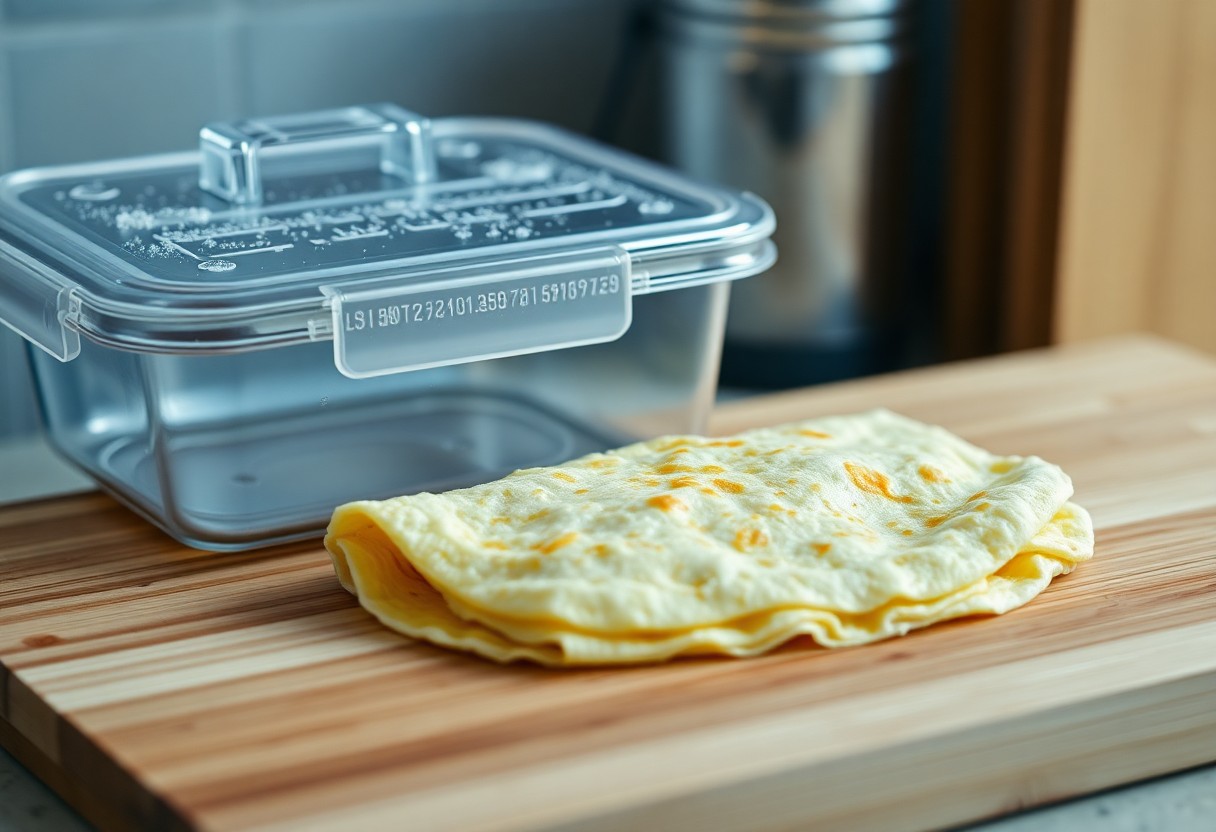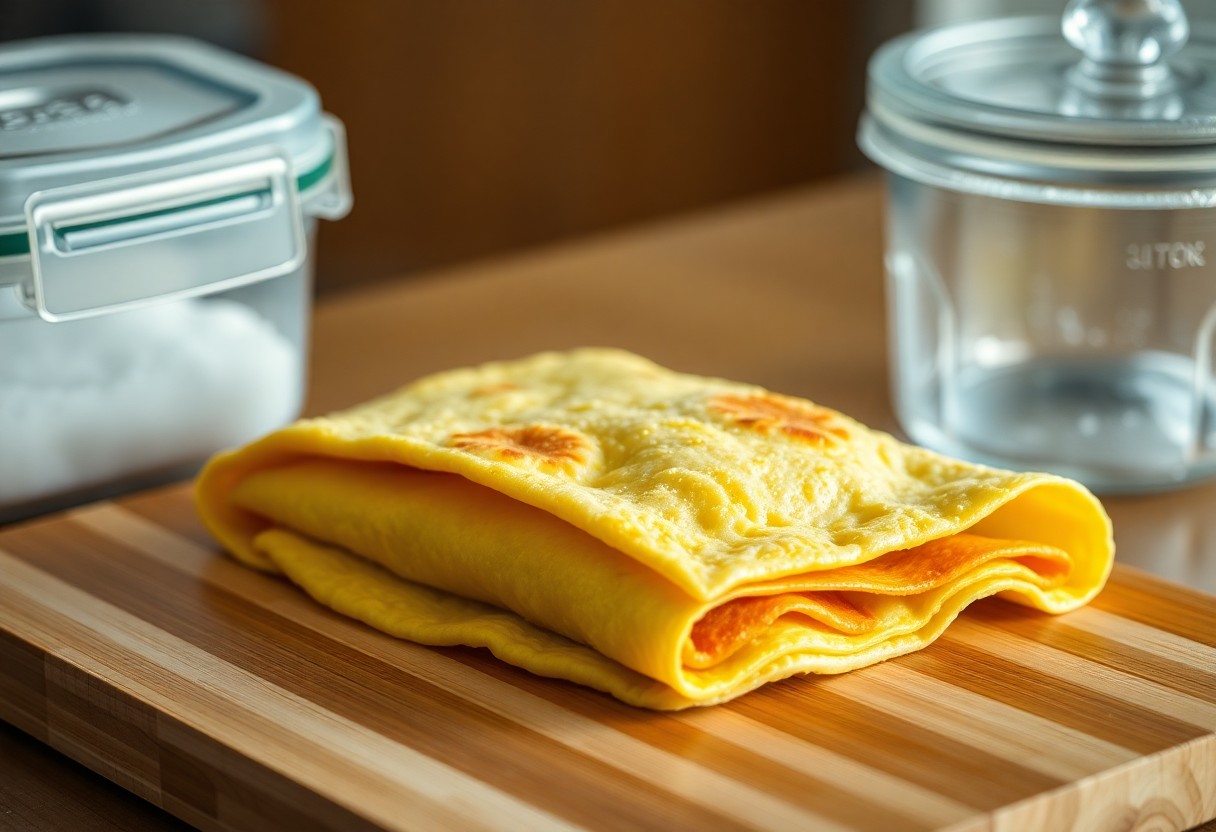As you consider meal prep options, you may wonder if you can freeze omelettes. You want to save time and enjoy a quick breakfast, but you’re unsure about the freezing process. You can freeze omelettes, but it’s necessary to follow proper techniques to maintain their texture and flavor. Your frozen omelettes can be just as delicious as freshly made ones, and you can enjoy them at your convenience.
Can You Freeze Omelette
For those who love omelettes, freezing them can be a great way to preserve leftovers or prep for future meals. You can freeze both cooked and uncooked omelettes, but the process differs slightly.
Freezing Cooked Omelette
Freezing a cooked omelette is a simple process that you can do at home. You can wrap your cooked omelette in plastic wrap or aluminum foil and place it in a freezer-safe bag to freeze.
Freezing Uncooked Omelette
Across the board, freezing uncooked omelette is a bit more complex, as you need to consider the ingredients and their textures. You can freeze your uncooked omelette mixture in an airtight container or freezer bag, but be aware that the eggs may become watery when thawed.
Hence, when you decide to freeze your uncooked omelette, you should consider the type of fillings you use, as some may not freeze well. You can experiment with different ingredients to find the combination that works best for your frozen omelette, and you’ll be able to enjoy a delicious, homemade omelette whenever you want.
Benefits of Freezing Omelette
You can enjoy several advantages by freezing omelettes, including convenience and time-saving. This method allows you to prepare your meals in advance, making your daily routine easier. Your frozen omelettes will be ready to eat whenever you need them.
Convenience
Among the benefits of freezing omelettes is the ability to have a quick and easy meal option available at any time, making it perfect for your busy days.
Time-Saving
Across various meal preparation scenarios, freezing omelettes proves to be an efficient way to manage your time, as you can cook a large batch at once and store it for later use.
With your omelettes frozen and ready to go, you can save time during your morning rush or when you need a quick snack, as all you have to do is thaw and reheat, allowing you to focus on other aspects of your daily life.

How to Freeze Omelette
Now that you’ve decided to freeze your omelette, it’s imperative to follow the right steps to maintain its quality and safety. You’ll need to take a few precautions to ensure your omelette remains fresh and delicious after freezing.
Preparation
Across the board, proper preparation is key to freezing omelettes successfully. You will need to cool your omelette completely before freezing to prevent the growth of bacteria and other microorganisms.
Storage
Against all odds, you can keep your frozen omelette fresh for a long time if you store it correctly. You should place your cooled omelette in an airtight container or freezer bag to prevent freezer burn and other forms of damage.
Also, when storing your frozen omelette, you should label the container or bag with the date and contents, and keep it at 0°F (-18°C) or below to maintain its quality and safety. You can store your frozen omelette for up to 3-4 months, and simply thaw and reheat it when you’re ready to eat it.
Reheating Frozen Omelette
Unlike fresh omelettes, frozen ones require special care when reheating. You can find more information on this topic on Can you freeze omelettes? : r/AskCulinary.
Methods
Reheating your frozen omelette is simple, you can use a microwave or oven to heat it up.
Tips
By following some tips, you can achieve the perfect reheated omelette. Here are some tips:
- Use low heat
- Cover with a lid
Thou should always check the temperature of your omelette before serving.
Another aspect to consider is the texture of your omelette. You can try different reheating methods to find the one that works best for you. Here are some additional tips:
- Use a toaster oven
- Add a little water
Thou will be enjoying your reheated omelette in no time.
Safety Considerations
Keep in mind that freezing an omelette requires careful consideration to ensure your safety and the quality of the dish. You should be aware of the potential risks and take necessary precautions.
Food Safety
With proper handling and storage, you can enjoy a frozen omelette without worrying about foodborne illness. You should always check the omelette for any signs of spoilage before freezing.
Texture and Quality
To maintain the texture and quality of your omelette, you should freeze it as soon as possible after cooking. You can also add ingredients that help preserve the texture, such as vegetables or cheese.
A delicate balance of texture and flavor is what makes a great omelette, and freezing can affect this balance. As you freeze your omelette, the eggs may become slightly watery, and the texture may change, but you can still achieve a delicious and safe dish by following proper freezing and reheating techniques, and you should experiment with different ingredients and methods to find your preferred texture and flavor.

Creative Uses for Frozen Omelette
To make the most of your frozen omelette, you can use it in various dishes, such as breakfast burritos, sandwiches, or as a filling for other recipes.
Meal Planning
Toward a more efficient meal planning, you can thaw your frozen omelette and add it to your daily meals, saving you time and effort in the kitchen.
Recipe Ideas
Taking your frozen omelette to the next level, you can use it as an ingredient in quiches, frittatas, or even as a topping for pizzas or salads.
And as you explore more recipe ideas, you can discover that your frozen omelette can be a versatile base for many dishes, allowing you to create new and exciting meals with minimal ingredients, and you can even customize them to suit your taste preferences and dietary needs.
To wrap up
Following this guide, you now know that you can freeze omelettes for later use. You can safely store your cooked omelettes in the freezer for up to 3 months. When you’re ready, you can thaw and reheat your frozen omelette with ease, enjoying a quick and delicious meal. Your frozen omelettes will retain their flavor and texture, making them a great option for your meal prep needs.
FAQ
Q: Can you freeze an omelette after it’s been cooked?
A: Yes, you can freeze an omelette after it’s been cooked. It’s best to cool it down to room temperature first to prevent the formation of ice crystals, which can affect the texture. Once cooled, you can place the omelette in an airtight container or freezer bag, making sure to remove as much air as possible before sealing. When you’re ready to eat it, simply thaw overnight in the fridge or reheat it in the microwave or oven.
Q: How long can a frozen omelette last in the freezer?
A: A frozen omelette can last for up to 3 to 4 months in the freezer. It’s important to label the container or bag with the date it was frozen so you can keep track of how long it’s been stored. The quality of the omelette may decrease over time, but it will still be safe to eat if stored properly at 0°F (-18°C) or below. When you decide to thaw and consume it, ensure it’s heated to an internal temperature of at least 165°F (74°C) to ensure food safety.
Q: What is the best way to thaw and reheat a frozen omelette?
A: The best way to thaw a frozen omelette is to place it in the refrigerator overnight. This method allows for even thawing and helps prevent bacterial growth. If you’re in a hurry, you can also thaw it more quickly by submerging the container or bag in cold water, changing the water every 30 minutes. To reheat, you can use the microwave, oven, or even a pan on the stovetop. For the microwave, heat on high for 20-30 seconds or until warmed through. For the oven, wrap the omelette in foil and heat at 300°F (150°C) for about 10-15 minutes. On the stovetop, place the omelette in a pan over low heat, flipping occasionally, until warmed through. Regardless of the method, ensure the omelette is heated to an internal temperature of at least 165°F (74°C) to ensure food safety.




Leave a Reply